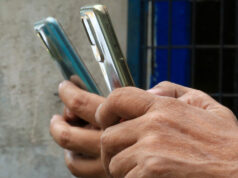DHAKA – Wearing bright saris and heavy make-up, many of Bangladesh’s transgenders, or hijras, spend their days begging from people stuck in traffic and shopkeepers who give them small change in exchange for lucky blessings.
The government recognized hijras as a third gender in 2013, but they remain marginalized in a country where sexual activity between people of the same sex is illegal. Many hijras live in abject poverty and have no opportunity for a proper education, much less a job. Many are forced to beg or engage in sex work to survive.
But on January 1, new textbooks were rolled out for millions of schoolchildren between the age of 11 and 13 featuring a segment on transgenders.
The textbook contains images of transgenders in respectable jobs, including a beautician, a development worker and an elected mayor, and the fictional story of a child who transitions, takes a female name and goes to live with a transgender community.
The creators of the book hope it will help nurture acceptance.
“We have piloted it in very small areas, and we got a very positive result, response from our students, because it was a completely unknown matter to them. It is new knowledge for them and they accepted it very well,” said Muhammad Moshiuzzaman, a member of the National Curriculum and Textbook Board.
“I think they are human beings just like us. We came to know about them by learning from the book, we think we should help them with their progress,” said Fatiah Alam, 12, a student at Gomail High school on the outskirts of the capital Dhaka, one of the schools that uses the new textbook.
Officials estimate there are about 10,000 hijras in Bangladesh but rights groups say the figure could be as high as 1.5 million in the country of 170 million people.
The textbook has not been welcomed by everyone. A large crowd of conservative Muslims angered by the inclusion of hijras recently held a protest at Dhaka’s main mosque calling for the textbook to be recalled.
Nevertheless, the transgender community and their supporters are hopeful that the textbooks will spread awareness and in turn help improve their status in society.
“If our story catches people’s attention and they keep our suffering in mind, that will be good for us. Those who learn more about us will hopefully understand and then work towards our development in the future,” transgender community leader Jonak told Reuters at her office in Dhaka. – Reuters




